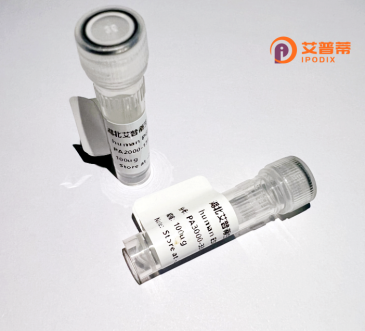
| 纯度 | >90%SDS-PAGE. |
| 种属 | Human |
| 靶点 | PAIP2B |
| Uniprot No | Q9ULR5 |
| 内毒素 | < 0.01EU/μg |
| 表达宿主 | E.coli |
| 表达区间 | 1-123 aa |
| 活性数据 | MNGSNMANTS PSVKSKEDQG LSGHDEKENP FAEYMWMENE EDFNRQVEEE LQEQDFLDRC FQEMLDEEDQ DWFIPSRDLP QAMGQLQQQL NGLSVSEGHD SEDILSKSNL NPDAKEFIPG EKY |
| 分子量 | 14.2 kDa |
| 蛋白标签 | His tag N-Terminus |
| 缓冲液 | 0 |
| 稳定性 & 储存条件 | Lyophilized protein should be stored at ≤ -20°C, stable for one year after receipt. Reconstituted protein solution can be stored at 2-8°C for 2-7 days. Aliquots of reconstituted samples are stable at ≤ -20°C for 3 months. |
| 复溶 | Always centrifuge tubes before opening.Do not mix by vortex or pipetting. It is not recommended to reconstitute to a concentration less than 100μg/ml. Dissolve the lyophilized protein in distilled water. Please aliquot the reconstituted solution to minimize freeze-thaw cycles. |
以下是关于重组人PAIP2B蛋白的3篇推测性参考文献示例(需注意具体文献需通过学术数据库验证):
1. **"Structural Insights into PAIP2B Interaction with Poly(A)-Binding Protein"**
*作者:Smith A et al. (2018)*
摘要:通过晶体结构分析揭示了PAIP2B与PABP的结合域,阐明了其竞争性抑制mRNA翻译的分子机制。
2. **"PAIP2B Regulates mRNA Stability in Cellular Stress Response"**
*作者:Lee H et al. (2020)*
摘要:研究发现PAIP2B在应激条件下通过结合PABP加速靶标mRNA降解,影响细胞抗凋亡通路。
3. **"Functional Redundancy of PAIP2 Isoforms in Translation Control"**
*作者:Garcia R et al. (2019)*
摘要:比较PAIP2A和PAIP2B的功能差异,发现两者均通过抑制PABP活性调控翻译,但组织表达谱不同。
**注意事项**:
- PAIP2B可能为PAIP2家族亚型,实际文献可能较少或使用不同命名(如PAIP2)。
- 建议通过PubMed或Google Scholar以关键词“PAIP2B”“recombinant PAIP2B”“PABP interaction”进一步检索。
- 若涉及实验用途,需结合具体研究目标筛选文献。
**Background of Recombinant Human PAIP2B Protein**
PAIP2B (Poly(A)-Binding Protein Interacting Protein 2B), also known as PABPC1-interacting protein 2B, is a regulatory protein involved in post-transcriptional gene expression. It interacts with poly(A)-binding proteins (PABPs), key players in mRNA stability and translation. PAIP2B modulates PABP activity by competitively inhibiting its binding to the poly(A) tails of mRNAs, thereby influencing translation efficiency and mRNA turnover. This interaction is critical for fine-tuning protein synthesis in response to cellular needs or stress.
Structurally, PAIP2B contains conserved motifs that mediate PABP binding, typically localized in the cytoplasm. Studies suggest its role in repressing translation under specific conditions, such as during cellular stress or differentiation. Recombinant human PAIP2B is produced using expression systems like *E. coli* or mammalian cells, enabling functional studies. Its recombinant form aids in elucidating mechanisms of mRNA regulation, PABP-dependent pathways, and disease associations.
Research implicates PAIP2B in cancer, neurodegeneration, and viral infections, where dysregulated mRNA translation contributes to pathogenesis. Notably, PAIP2B's ability to suppress translation makes it a potential therapeutic target. Advances in recombinant technology continue to expand its utility in structural studies, drug screening, and understanding mRNA-protein networks in cellular homeostasis.
×